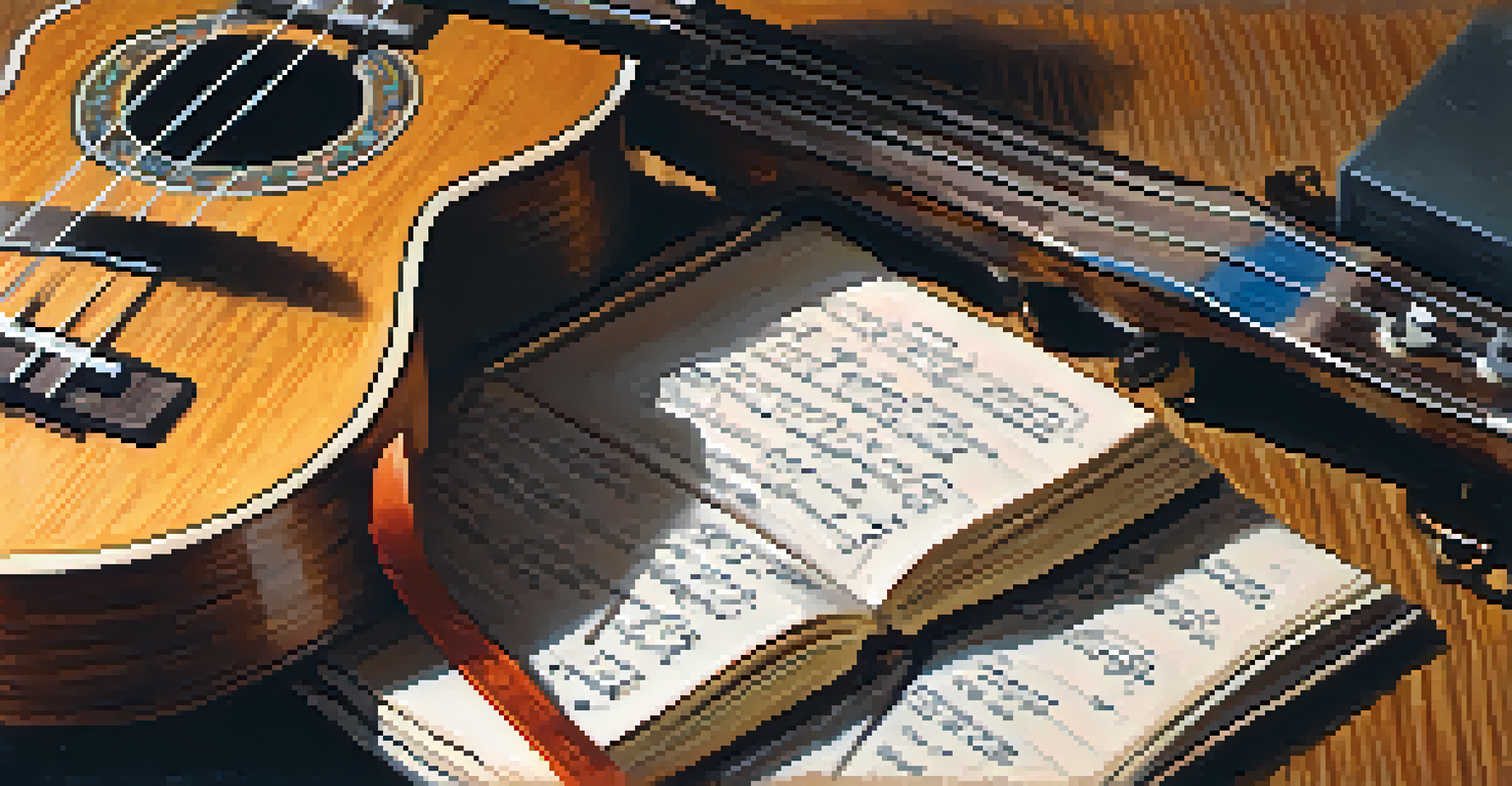Using the Ukulele for Writing Emotional Ballads

Why Choose the Ukulele for Emotional Ballads?
The ukulele is often associated with cheerful tunes, but its warm sound can evoke deep emotions, making it perfect for ballads. Its soft and soothing tones create an intimate atmosphere, allowing you to express vulnerability in your lyrics. Plus, the instrument's simplicity makes it accessible for songwriters at any level, encouraging experimentation.
Music can change the world because it can change people.
Imagine strumming a few gentle chords while reminiscing about a lost love or a cherished memory. The ukulele's unique timbre can enhance the emotional depth of your songwriting, making listeners feel connected to your story. This connection is vital in ballad writing, where the goal is to resonate with your audience on a personal level.
Moreover, the ukulele's portability means you can take it anywhere – from a quiet park to a cozy café. This flexibility allows for spontaneous songwriting sessions that can lead to genuine and heartfelt ballads. So, whether you’re at home or out and about, the ukulele is the perfect companion for your creative journey.
Finding Inspiration for Your Lyrics
Inspiration can strike at any moment, but it's essential to know where to look. Personal experiences often serve as the richest source for emotional ballads. Reflect on your own life events, whether it's love, heartbreak, joy, or loss, and use these feelings as a foundation for your lyrics.

Another great way to find inspiration is through storytelling. Think about a character or a situation that resonates with you, and build a narrative around it. For example, imagine a character who is longing for a past relationship - this can be a powerful theme in your ballad, helping to evoke empathy and connection with your audience.
Ukulele's Emotional Potential
The ukulele's warm tones and accessibility make it an ideal instrument for crafting heartfelt ballads.
Don’t overlook the power of nature and surroundings as well. A walk in the park or a sunset can spark ideas and emotions. Keeping a journal handy can help you jot down these fleeting thoughts, making it easier to develop them into lyrics later. Inspiration is everywhere; you just need to be open to it!
Crafting Your Chords and Melody
Once you have your lyrics, the next step is to create a fitting melody and chord progression. Start with simple chords; the ukulele is tuned to G-C-E-A, which offers a range of harmonious combinations. For a ballad, try using major and minor chords to convey contrasting emotions that reflect your lyrics.
The beautiful thing about music is that it transcends language.
For instance, a progression like C-G-Am-F can evoke a sense of longing, while variations like Am-F-C-G can express deeper sorrow. Don’t be afraid to experiment; sometimes the most beautiful melodies come from unexpected chord changes. Listen for the emotional tone that resonates with your story.
As you strum along, pay attention to how the melody flows with your lyrics. The rhythm and pace can significantly impact the song's emotional weight. Slower tempos often work well for ballads, allowing the listener to absorb each word and note fully.
Utilizing Dynamics to Enhance Emotion
Dynamics play a crucial role in conveying emotion through music. On the ukulele, you can vary your strumming technique to create contrasts in volume and intensity. For example, start softly during the verses to build intimacy, then gradually increase your volume during the chorus to evoke a sense of passion or urgency.
Consider using fingerpicking techniques for the verses, which can add a gentle touch, while shifting to a more robust strumming pattern for the chorus. This shift not only captures the listener's attention but also enhances the emotional narrative of your ballad.
Finding Inspiration Everywhere
Personal experiences, storytelling, and nature can serve as rich sources of inspiration for your lyrics.
Additionally, don’t underestimate the power of silence. Pausing for a moment can allow your audience to reflect on the lyrics and the feelings they evoke. This intentional use of dynamics and silence can transform a simple ballad into an unforgettable emotional experience.
Writing Relatable Lyrics: Tips and Tricks
Relatable lyrics are essential for crafting an emotional ballad that resonates with listeners. Start with specific details from your experiences; the more personal and vivid your descriptions, the easier it is for others to connect. Use imagery and metaphors to paint a picture that evokes feelings and memories in your audience.
For example, instead of saying 'I miss you,' you might describe the empty seat at the table or the scent of their favorite perfume lingering in the air. Such details create a richer narrative and invite listeners into your emotional world, making your ballad more impactful.
Don't shy away from vulnerability in your lyrics. Sharing your fears, hopes, and dreams makes your song authentic. The more genuine your emotions, the more likely they will resonate with others. Remember, everyone has felt heartbreak, joy, or nostalgia – tapping into these universal feelings can create a powerful connection.
The Importance of Revision and Feedback
Once you’ve penned your ballad, it's time to step back and revise. Great songs often go through multiple drafts before reaching their final form. Take a break from your work to return with fresh ears; this distance can help you identify areas that need improvement, whether it’s the melody, lyrics, or overall flow.
Seeking feedback from trusted friends or fellow musicians can also provide valuable insights. They might catch something you've overlooked or suggest a different approach that enhances your song. Constructive criticism can be a powerful tool for refining your work, so embrace it!
Revise and Seek Feedback
Revising your work and seeking constructive feedback are essential steps in refining your ballad for emotional impact.
Remember, even the most famous songwriters revise their work multiple times. Don’t be afraid to make changes, whether it’s altering a chord, rephrasing a line, or even reworking the entire structure. This process of refinement is crucial in creating a ballad that truly resonates with your audience.
Performing Your Emotional Ballad with Confidence
After you’ve crafted your ballad, it’s time for the exhilarating experience of performing it. Take a moment to connect with your emotions before stepping on stage or sharing your song with friends. This connection will enhance your performance and allow you to convey the song’s message more authentically.
Practice is key; the more familiar you are with your song, the more confidence you'll exude while performing. Consider performing in front of a mirror or recording yourself to identify areas for improvement. With each practice session, you'll become more comfortable and natural with your delivery.

Finally, remember that every performance is an opportunity to share your story. Embrace the moment, and don’t be afraid to show vulnerability; your audience will appreciate the honesty in your performance. Owning your narrative is the final step in creating an emotional ballad that truly resonates.